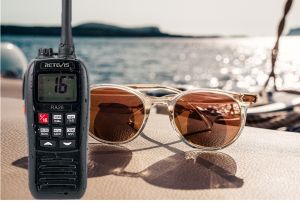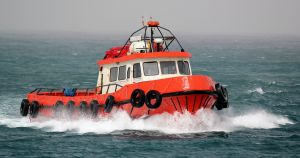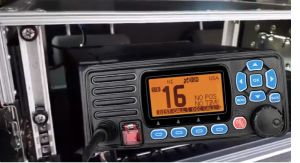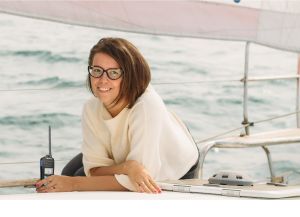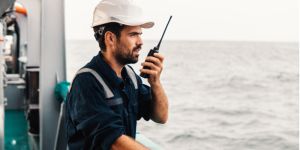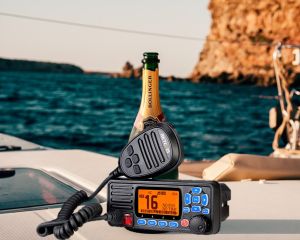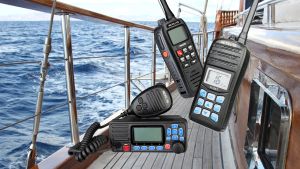Category Archives :Maritime knowledge
Brief introduction of RA26
- Jun 10,2021
- Leeric
- 0 Comments
- Maritime knowledge
Retevis ra26 is a professional compact marine waterproof interphone, which is suitable for marine operations, such as fishing at sea, offshore oil production, extradition of ships at ports, distress alarm of waterway, etc. ...
How to make a Mayday call by VHF Marine Radio
- Jun 01,2021
- Leeric
- 0 Comments
- Maritime knowledge
If you have a DSC-equipped radio, flip up the cover on the DSC button and press the button for 3 to 5 seconds. Some radios will allow you to choose your problem from a list (Fire/Explosion, Flooding, Collision, Grounding, Capsizing, Sinking, Adrift, Abandoning Ship, Piracy, Man Overboard) so that vessels receiving your transmission will automatically know what happened. ...
Please help the coast guard help you
- May 24,2021
- Leeric
- 0 Comments
- Maritime knowledge
The Coast Guard must respond to about 60,000 emergency calls each year (while saving nearly 5,000 lives annually) using limited resources. According to Coast Guard say, “Of the roughly 100 digital selective calling distress alerts we are now receiving each month, approximately nine out of 10 do not have position information (i.e., do not have a GPS navigation receiver interconnected to their DSC-equipped VHF radio), and approximately six out of 10 have not registered their MMS ...
About Marine VHF Radio
- May 22,2021
- Leeric
- 0 Comments
- Maritime knowledge
Marine VHF radio is installed on all large ships and most seagoing small craft. It is used for a wide variety of purposes, including summoning rescue services and communicating with harbors, locks, bridges and marinas, and operates in the VHF frequency range, between 156 to 174 MHz. Although it is widely used for collision avoidance, its use for this purpose is contentious and is strongly discouraged by some countries, including the UK. ...
Marine VHF Radio Etiquette
- May 15,2021
- Leeric
- 0 Comments
- Maritime knowledge
VHF protocol is to repeat the name of the boat you’re calling two or three times, followed by “this is…” and the name of your vessel twice.After making contact, request to switch from the hailing channel (16) to a working channel such as 68, 69, or 72 for conversation. The other person should reply confirming that channel, or propose another. Without confirmation, you can find yourself scanning channels to find where the other person went, or if they heard you clearly. ...
The Marine VHF Radio Jargon Buster
- May 08,2021
- Leeric
- 0 Comments
- Maritime knowledge
This system is used by shipping. It allows another vessel or coast station to use equipment that can interrogate the radio in order to learn the course, speed, type of vessel, cargo, etc. It is also available to recreational vessels. ...
How to broadcast a Mayday emergency call?
- May 08,2021
- Leeric
- 0 Comments
- Maritime knowledge
How to broadcast a MAYDAY emergency call if a vessel or person is in grave and imminent danger and immediate assistance is required: Check that your VHF radio is on and high power setting is selected Select Channel 16 (or 2182kHz for MF) ...
Guidance For Marine Radio Distress
- Apr 26,2021
- Leeric
- 0 Comments
- Maritime knowledge
The Royal Yachting Association (RYA) has recently published guidance about marine radio distress relays on their website. The changes follow on from a consultation between the Maritime and Coastguard Agency (MCA), the Association of Marine Electronic and Radio Colleges (AMERC) and the RYA itself. As a result, the RYA has issued revised guidance regarding the procedure for sending a ‘Distress Relay’. ...
Carry A Calling Device For Help At Sea
- Apr 26,2021
- Leeric
- 0 Comments
- Maritime knowledge
The ability to call for help or signal for assistance is imperative. With a VHF or DSC radio you can transmit a Mayday call to the Coastguard and other vessels and a distress or emergency beacon will transmit your location to the search and rescue services. ...
Minium qualification for a maritime coast licence
- Apr 15,2021
- Leeric
- 0 Comments
- Maritime knowledge
Now, if you want to use VHF marine radio, you must have relevant certificates. If you don't have relevant certificates, you will encounter some troubles. So how can we get the relevant documents and what are they? Now we have taken Australia as an example to introduce some documents. ...

